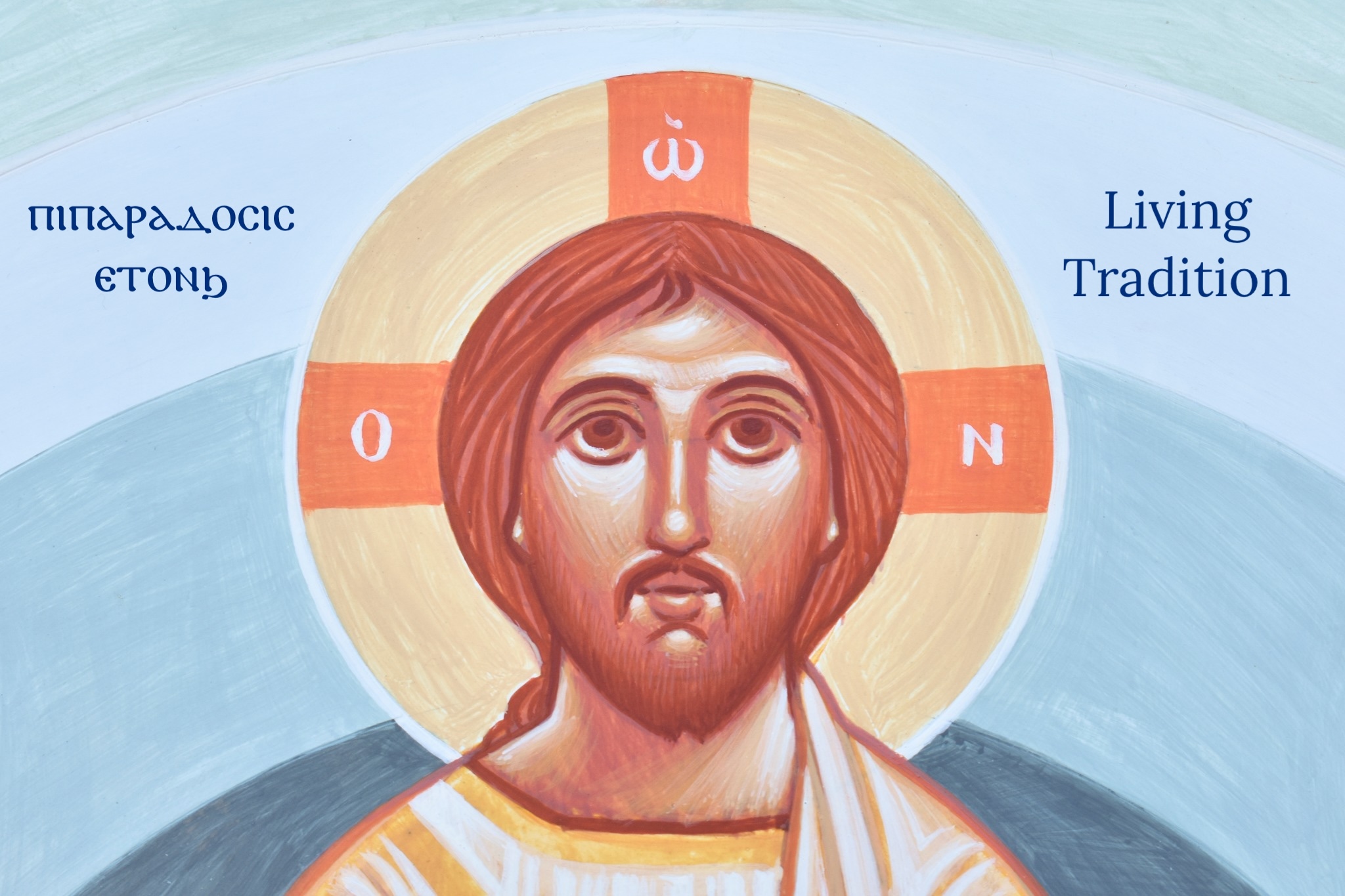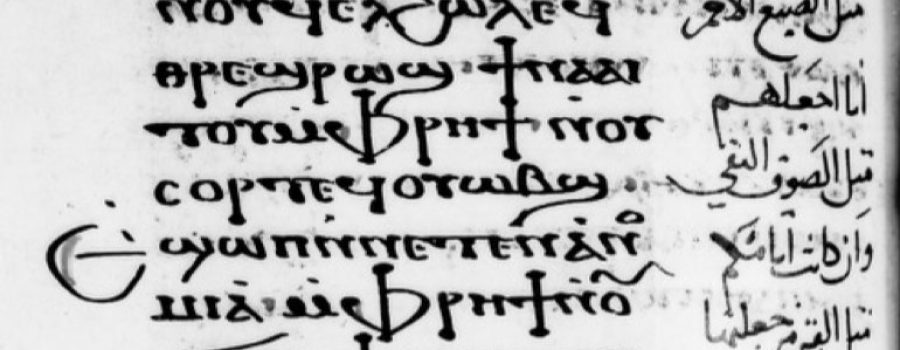An interesting tidbit today from working on the Psalmody!
In one of the interpretations of the Sunday ⲑⲉⲟⲧⲟⲕⲓⲁ, the author references Isaiah 1:18:
ⲟⲩⲟϩ ⲁⲙⲱⲓⲛⲓ ⲙⲁⲣⲉⲛⲥⲁϩⲱⲛ ⲡⲉϫⲉ ⲡ⳪ ⲟⲩⲟϩ ⲉϣⲱⲡ ⲉⲣⲉ ⲛⲉⲧⲉⲛⲛⲟⲃⲓ ⲟⲓ ⲙ̀ⲫⲣⲏϯ ⲛ̀ⲟⲩⲫⲟⲓⲛⲓⲕⲟⲩⲙ ⲉⲓⲉⲑⲣⲟⲩⲟⲩⲃⲁϣ ⲙ̀ⲫⲣⲏϯ ⲛ̀ⲟⲩⲭⲓⲱⲛ ⲟⲩⲟϩ ⲉϣⲱⲡ ⲉⲩⲟⲓ ⲙ̀ⲫⲣⲏϯ ⲛ̀ⲟⲩⲕⲟⲕⲕⲟⲥ ϯⲛⲁⲑⲣⲟⲩⲟⲩⲃⲁϣ ⲙ̀ⲫⲣⲏϯ ⲛ̀ⲟⲩⲥⲟⲣⲧ ⲛ̀ⲟⲩⲱⲃϣ
And come, let us reason together, saith the Lord: and though your sins be as purple, I will make them white as snow; and though they be as scarlet, I will make them white as wool.
The text in the interpretation reads:
| Ⲁⲙⲱⲓⲛⲓ ϩⲁⲣⲟⲓ ⳾ ⲛⲉⲛϣⲏⲣⲓ ⲙ̀ⲡⲓⲥⲣⲁⲏⲗ ⳾ ⲁⲛⲟⲕ ⲡⲉ ⲡⲉⲧⲉⲛⲛⲟⲩϯ ⳾ ⲡⲁⲣⲁⲛ ⲉⲙⲙⲁⲛⲟⲩⲏⲗ ⳾ | Come you to me, • O children of Israel. • I am your God. • My name is Emmanuel. • |
| Ⲛⲁⲣⲉ ⲛⲉⲧⲉⲛⲛⲟⲃⲓ ⲟⲓ ⳾ ⲛ̀ⲟⲩϥⲉⲗϩⲱⲗ ⲉϥⲑⲣⲉϣⲣⲱϣ ⳾ ϯⲛⲁⲁⲓⲧⲟⲩ ⲙ̀ⲫⲣⲏϯ ⳾ ⲛ̀ⲟⲩⲥⲟⲣⲧ ⲉϥⲟⲩⲱⲃϣ ⳾ | Though your sins • be as scarlet, • I will make them • as white as wool. |
| Ⲉϣⲱⲡ ⲛ̀ⲛⲉⲧⲉⲛⲁⲛⲟⲙⲓⲁ ⳾ ⲙ̀ⲫⲣⲏϯ ⲛ̀ⲟⲩϭⲏϫⲓ ⳾ ϯⲛⲁⲁⲓⲧⲟⲩ ⲙ̀ⲫⲣⲏϯ ⳾ ⲛ̀ⲟⲩⲭⲓⲱⲛ ⲙ̀ⲃⲉⲣⲓ ⳾ | And if your sins • be as crimson/purple, • I will make them • as snow, anew. • |
The Coptic ϥⲉⲗϩⲱⲗ ⲉϥⲑⲣⲉϣⲣⲱϣ (See Crum, p.48); ϥⲉⲗϩⲱⲗ is a variant form of ⲃⲉϩⲱⲗ S (ⲃⲉⲗϩⲱⲗ/ⲃⲉⲣϩⲱⲗ B, ⲃⲟⲩϩⲱⲗ F) which is a kind of date-palm (بلح). This variant is only documented in this interpretation of the fourth segment of the Sunday Tadakia. A number of fascinating points are to be made here: 1) The two stanzas invert the order in the original reference—Isaiah 1:18, 2) While the Scripture employs the word ⲕⲟⲕⲕⲟⲥ, the author chooses to use the word ϥⲉⲗϩⲱⲗ to describe the red color of the sins of the people, choosing a fruit of great significance to the Coptic people (Happy Nayrouz :)), and 3) the author uses the word ϭⲏϫⲓ to replace ⲫⲟⲓⲛⲓⲕⲟⲩⲙ for the color purple.
While Crum’s dictionary (p.48) mentions that ϥⲉⲗϩⲱⲗ is being used to replace/reference ⲫⲟⲓⲛⲓⲕⲟⲩⲙ (φοινιξ), I do believe it is mistaken since it doesn’t align with the following segment of the verse.
And since I have you here and you’ve read this far, here’s another beautiful and short prayer that is our original conclusion for the hours of the ⲁϫⲡⲓⲁ:
| ⲡ⳪ ⲛⲁⲓ ⲛⲁⲛ (ⲅ︦) ⳾ ϯⲧⲣⲓⲁⲥ ⲉ︦ⲑ︦ⲩ︦ ⳾ ⲫϯ ⲧⲉⲛϩⲉⲗⲡⲓⲥ ⳾ ⲛⲁⲓ ϧⲁ ⲡⲉⲕⲡⲗⲁⲥⲙⲁ ⳾ ⲟⲩⲟϩ ⲥⲱϯ ⲛ̀ⲛⲉⲛⲯⲩⲭⲏ ⳾ | LORD, have mercy! (3x) O Holy Trinity, • God, our hope, • have mercy on Your creation • and save our souls! • |
While most of us see the common, “Have mercy on us, O God, and have mercy on us…” this was not the original conclusion of the hours in the Coptic Rite. It is likely originally a Greek prayer “ο εν παντι καιρω” (You who at all times) and was translated into Coptic, hence the older Coptic texts do not include the beginning “have mercy on us…”







Leave a Reply
Your email is safe with us.